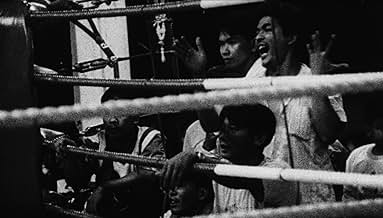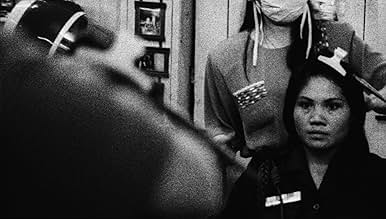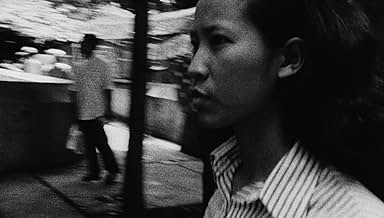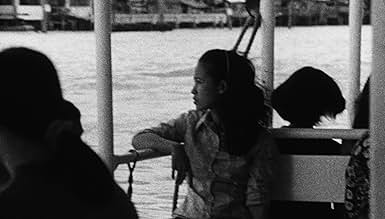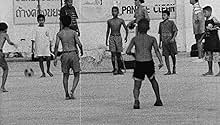IMDb रेटिंग
6.7/10
1.9 हज़ार
आपकी रेटिंग
अपनी भाषा में प्लॉट जोड़ेंA film crew documents a folk story-exquisite corpse combination by random Thai people; the story is reenacted.A film crew documents a folk story-exquisite corpse combination by random Thai people; the story is reenacted.A film crew documents a folk story-exquisite corpse combination by random Thai people; the story is reenacted.
- पुरस्कार
- 4 जीत और कुल 4 नामांकन
फ़ीचर्ड समीक्षाएं
An interesting film, more for the idea behind it and moments captured than the overall execution.
A filmmaker rolls around town in search of a story, making the film we see. It begins with long footage of driving around Bangkok, then we segue to the story proper with a woman being interviewed, asked about a story.
The story is made-up, the point is not the story of course, but dismantling the conventional telling. Different people are interviewed who bend the story to their fancy, adding stuff. We are not entirely sure who among them are actors coached on what to say, who are passers-by blurting out what comes in their heads. We can tell that some of it was obviously blocked to be filmed, some covertly staged as real and some stolen from glances but the whole is pretty seamless.
This is an opportunity to film all sorts of activities and splice it together to see what kind of sense comes out; among them an amateur theatric production of the story, a simulated TV interview filmed off the TV, (faux?) newsreel footage, real scenes of boxing, a singing contest and sex show, a scene from the film but the camera keeps rolling through the break. When the crippled boy is assigned a random background by one of the interviewees, in the following scene his teacher acquires the same background of war and family loss.
In the West, we have similar films of stories about stories in Saragossa Manuscript and such, where usually the point is structure, hidden meaning and the divination of self.
In the East, specifically Thailand, they have their own traditions of light storytelling and meta-narrative sorting of concepts, both defined by cultural proximity to India. Among the three 'holy' texts of their native Buddhism is a body of work called Abhidharma, teachings about the teachings. Composed after the Buddha's time, commentaries upon commentaries form a complex, layered web of cataloguing various ontological attributes of reality, phenomena and self. Boring if you ever try to read it.
On a historical note, there is evidence that abhidharmic influence in the north of India in turn rippled West through Persia to influence gnostic thought, and East through the Silk Road as both reaction to its scholasticism and elaboration of it contributed to early Chinese Buddhism. In both cases, the distinction is made between mere intellectual reasoning in the abhidharmic vein, and expansive meditative wisdom that looks directly at things. (respectively, gnosis and prajna)
Anyway, the film has no direct link to all that except as pointing to the mesh of meta-narrative.
And it's cool to note that springing from a Buddhist background, in this film of stories about stories the stories are transient, illusory confabulations, there's no intrinsic meaning or symbolism to them, there's no structure beyond co-dependent arising of narrator and image, and the narrator is neither a single self nor on some journey to enlightenment. Nice, if you don't burden yourself with futilely trying to organize the tangle, just directly look at the wondrous nothingness.
The last story is made-up by schoolchildren, collapsing in a fantastical, meaningless heap of witch tigers and magical swords, illusory child's play.
The closing shots are of children kicking a ball, the rush of actual life outside the stories which is the most mysterious object of all.
A filmmaker rolls around town in search of a story, making the film we see. It begins with long footage of driving around Bangkok, then we segue to the story proper with a woman being interviewed, asked about a story.
The story is made-up, the point is not the story of course, but dismantling the conventional telling. Different people are interviewed who bend the story to their fancy, adding stuff. We are not entirely sure who among them are actors coached on what to say, who are passers-by blurting out what comes in their heads. We can tell that some of it was obviously blocked to be filmed, some covertly staged as real and some stolen from glances but the whole is pretty seamless.
This is an opportunity to film all sorts of activities and splice it together to see what kind of sense comes out; among them an amateur theatric production of the story, a simulated TV interview filmed off the TV, (faux?) newsreel footage, real scenes of boxing, a singing contest and sex show, a scene from the film but the camera keeps rolling through the break. When the crippled boy is assigned a random background by one of the interviewees, in the following scene his teacher acquires the same background of war and family loss.
In the West, we have similar films of stories about stories in Saragossa Manuscript and such, where usually the point is structure, hidden meaning and the divination of self.
In the East, specifically Thailand, they have their own traditions of light storytelling and meta-narrative sorting of concepts, both defined by cultural proximity to India. Among the three 'holy' texts of their native Buddhism is a body of work called Abhidharma, teachings about the teachings. Composed after the Buddha's time, commentaries upon commentaries form a complex, layered web of cataloguing various ontological attributes of reality, phenomena and self. Boring if you ever try to read it.
On a historical note, there is evidence that abhidharmic influence in the north of India in turn rippled West through Persia to influence gnostic thought, and East through the Silk Road as both reaction to its scholasticism and elaboration of it contributed to early Chinese Buddhism. In both cases, the distinction is made between mere intellectual reasoning in the abhidharmic vein, and expansive meditative wisdom that looks directly at things. (respectively, gnosis and prajna)
Anyway, the film has no direct link to all that except as pointing to the mesh of meta-narrative.
And it's cool to note that springing from a Buddhist background, in this film of stories about stories the stories are transient, illusory confabulations, there's no intrinsic meaning or symbolism to them, there's no structure beyond co-dependent arising of narrator and image, and the narrator is neither a single self nor on some journey to enlightenment. Nice, if you don't burden yourself with futilely trying to organize the tangle, just directly look at the wondrous nothingness.
The last story is made-up by schoolchildren, collapsing in a fantastical, meaningless heap of witch tigers and magical swords, illusory child's play.
The closing shots are of children kicking a ball, the rush of actual life outside the stories which is the most mysterious object of all.
The strangest film I've seen in some time is an experimental docu-drama from Thailand called Mysterious Object at Noon, directed by Apichatpong Weerasethakul, a Thai architect who has an MFA in film from the School of the Art Institute of Chicago (which, when you think about it, is a great town for an architect to go to in order to study film). It's not a docu-drama in the American sense of the word, but rather a film that documents a narrative, the tale of a home study teacher and her disabled student. How it does this is what is so unusual. Working for over three years with an all-volunteer cast & crew which also means an ever-changing cast & crew Weerasethakul employed the surrealist game of the Exquisite Corpse, which, as described by one web site devoted to this practice,
was played by several people, each of whom would write a phrase on a sheet of paper, fold the paper to conceal part of it, and pass it on to the next player for his contribution.
Now imagine playing this same game with film, not only with the urban elites of Bangkok, but with villagers in Weerasethakul's native north who have only limited experience with cinema and no real concept of fiction. The results are both primitive and startling. Filmed in black & white with the cheapest imaginable equipment and film stock, Mysterious Object is something akin to a surrealist version of Dziga Vertov's Man with a Movie Camera set in the Thailand of the 1990s, which means everything from contemporary skyscrapers and freeway on-ramps to elephants wandering into the scene as some boys who've been playing a version of hacky sack try to improvise what might come next. One group of villagers act out their section, which includes music (some of it involving a mouth organ unlike anything I've ever seen before). Another woman, early on, simply tells her own story, which involves being sold by her father in return for bus fare. There is a long truck ride through Bangkok at the beginning that feels like an homage both to Vertov and to Tarkovsky's Solaris until the driver and his partner start trying to sell tuna. During the course of the film, the teacher gives birth tho that verb phrase doesn't really do justice to what actually happens to a young man who zips her unconscious body into a closet and ransacks the student's home, World War 2 comes to a conclusion, the populace is admonished to buy American products, aliens invade, and the teacher gets a rash. The young boy is both much loved and abandoned by his parents. At one point, the boy to whom the teacher gives birth turns into a murderous giant. The one element that Weerasethakul uses to keep his various narrative threads from entirely spinning out of control is a small team of actors who periodically act out some of the threads narrated by different speakers.
This film works for many of the same reasons that any artwork that is actively trying to invent its own genre does in this sense, Man with a Movie Camera, as well as books as diverse as Tristram Shandy, The Childlike Life of the Black Tarantula, Moby Dick, Spring & All and Visions of Cody, are almost parallel projects. Each questions everything and makes no assumptions as to how to proceed. In this context, even a wrong decision (presuming of course we could define such) would be a fresh one. At the same time, Weerasethakul clearly understands this role as historical there is a scene in which the film-maker and his colleagues are walking along & one comments "We should have had a script." The film ends when & where it does because that's where, literally, the film stock Weerasethakul had at his disposal ran out.
If you don't care for experimental cinema, you can almost be certain that you're going to hate this film. Even if you love the work of Stan Brakhage, Warren Sonbert & Abigail Child, you may find it hard to imagine that something like this can still be produced in the 21st century. Would it still hold its fascination if the film were in English about Oakland? Frankly, it might not Steve Benson, who first turned me on Mysterious Object, calls Tropical Malady, Weerasethakul's other film available through NetFlix, "catastrophically disappointing" tho it won the Jury Prize at Cannes in 2004. In any event, there is this film, which taken on its own is a dive into a culture and into a perspective on cinema that few of us will every have the opportunity to experience directly. As such, it's a trip you should probably take.
was played by several people, each of whom would write a phrase on a sheet of paper, fold the paper to conceal part of it, and pass it on to the next player for his contribution.
Now imagine playing this same game with film, not only with the urban elites of Bangkok, but with villagers in Weerasethakul's native north who have only limited experience with cinema and no real concept of fiction. The results are both primitive and startling. Filmed in black & white with the cheapest imaginable equipment and film stock, Mysterious Object is something akin to a surrealist version of Dziga Vertov's Man with a Movie Camera set in the Thailand of the 1990s, which means everything from contemporary skyscrapers and freeway on-ramps to elephants wandering into the scene as some boys who've been playing a version of hacky sack try to improvise what might come next. One group of villagers act out their section, which includes music (some of it involving a mouth organ unlike anything I've ever seen before). Another woman, early on, simply tells her own story, which involves being sold by her father in return for bus fare. There is a long truck ride through Bangkok at the beginning that feels like an homage both to Vertov and to Tarkovsky's Solaris until the driver and his partner start trying to sell tuna. During the course of the film, the teacher gives birth tho that verb phrase doesn't really do justice to what actually happens to a young man who zips her unconscious body into a closet and ransacks the student's home, World War 2 comes to a conclusion, the populace is admonished to buy American products, aliens invade, and the teacher gets a rash. The young boy is both much loved and abandoned by his parents. At one point, the boy to whom the teacher gives birth turns into a murderous giant. The one element that Weerasethakul uses to keep his various narrative threads from entirely spinning out of control is a small team of actors who periodically act out some of the threads narrated by different speakers.
This film works for many of the same reasons that any artwork that is actively trying to invent its own genre does in this sense, Man with a Movie Camera, as well as books as diverse as Tristram Shandy, The Childlike Life of the Black Tarantula, Moby Dick, Spring & All and Visions of Cody, are almost parallel projects. Each questions everything and makes no assumptions as to how to proceed. In this context, even a wrong decision (presuming of course we could define such) would be a fresh one. At the same time, Weerasethakul clearly understands this role as historical there is a scene in which the film-maker and his colleagues are walking along & one comments "We should have had a script." The film ends when & where it does because that's where, literally, the film stock Weerasethakul had at his disposal ran out.
If you don't care for experimental cinema, you can almost be certain that you're going to hate this film. Even if you love the work of Stan Brakhage, Warren Sonbert & Abigail Child, you may find it hard to imagine that something like this can still be produced in the 21st century. Would it still hold its fascination if the film were in English about Oakland? Frankly, it might not Steve Benson, who first turned me on Mysterious Object, calls Tropical Malady, Weerasethakul's other film available through NetFlix, "catastrophically disappointing" tho it won the Jury Prize at Cannes in 2004. In any event, there is this film, which taken on its own is a dive into a culture and into a perspective on cinema that few of us will every have the opportunity to experience directly. As such, it's a trip you should probably take.
"Mysterious" held much dramatic promise.
But because of its hybrid innovation, I'm at a lost as to rate it as a dramatic feature or a documentary film. Either way, despite its critical accolades, it wasn't able to interest me enough to wanna cradle its inadequacies. Poor film making craft is inexcusable even if this feature is excusably in a league of its own. (And did anyone catch a moment of Ozu homage in one of the scenes, with children walking by at one end and the camera placed at another? Nice...)
That said, there were undeniable moments of brilliance in it. Two standouts come to mind; The "banter" between the two mute girls and that staged re-enactment by the villagers. And it shown the director to be one who knows how to capture such cinematic sparks, albeit inconsistently.
I thus hope to see "Blissfully yours" before I decide on my regard for Apichatpong Weerasethakul as a film maker. Similarly, "Mysterious" will be given the benefit of the doubt. For honestly, it just didn't hack it for me right now.
But because of its hybrid innovation, I'm at a lost as to rate it as a dramatic feature or a documentary film. Either way, despite its critical accolades, it wasn't able to interest me enough to wanna cradle its inadequacies. Poor film making craft is inexcusable even if this feature is excusably in a league of its own. (And did anyone catch a moment of Ozu homage in one of the scenes, with children walking by at one end and the camera placed at another? Nice...)
That said, there were undeniable moments of brilliance in it. Two standouts come to mind; The "banter" between the two mute girls and that staged re-enactment by the villagers. And it shown the director to be one who knows how to capture such cinematic sparks, albeit inconsistently.
I thus hope to see "Blissfully yours" before I decide on my regard for Apichatpong Weerasethakul as a film maker. Similarly, "Mysterious" will be given the benefit of the doubt. For honestly, it just didn't hack it for me right now.
Director Apichatpong Weerasethakul went around Thailand with a film crew for three years, having what seem to be random people tell a round-robin story. One person would tell one part, then on to the next. It's a technique I've seen used in a couple of amateur-press stories from the 1930s, when professional science fiction writers were cheap -- the line was that WONDER STORIES offered a quarter cent per word, payable upon lawsuit. One writer would start the story, another would continue for a few pages, and so forth.
As a story-telling movie, it's .... well, it's an interesting experiment that does not work. The writers in the 1930s round-robin stories were pros, who understood how plotting worked and how far they could veer. With this one, we watch people do a hard left on the story, argue about what has been been decided earlier in the story. It's less like the way in LOVE ME TONIGHT, the song "Isn't It Romantic?" wafts from Paris to a distant castle, changing to various tempi along the way, and more like the way my great-aunt Esther would tell a story. She would drone on for about thirty minutes, pause to make sure I understood some point -- "...so they had to find the money for the rent. If they didn't pay the rent, they could be out on the street, you know what I mean?" After I would tiredly admit that I understood eviction, she would continue with "So once I knew this guy, I think I met him through my friend Rosie from high school, he had a picture of Rutherford B. Hayes on his kitchen wall next to the electric clock." Then she would talk about the clock for half an hour. Not that there was anything interesting about the clock; had there been, I think, she would never have mentioned it at all.
That's what the story-telling in this reminds me of. Oh, the people are trying to tell a good story, but they lack the training.
What I think this movie works as is a city-symphony picture, one of those movies in the 1920s and 1930s which purported to show you Berlin in BERLIN, SYMPHONY OF A GREAT CITY or New York in MANHATTA. I think it works better as that, although it's less about the city and the countryside, their institutions and rhythms, than individuals.
As a story-telling movie, it's .... well, it's an interesting experiment that does not work. The writers in the 1930s round-robin stories were pros, who understood how plotting worked and how far they could veer. With this one, we watch people do a hard left on the story, argue about what has been been decided earlier in the story. It's less like the way in LOVE ME TONIGHT, the song "Isn't It Romantic?" wafts from Paris to a distant castle, changing to various tempi along the way, and more like the way my great-aunt Esther would tell a story. She would drone on for about thirty minutes, pause to make sure I understood some point -- "...so they had to find the money for the rent. If they didn't pay the rent, they could be out on the street, you know what I mean?" After I would tiredly admit that I understood eviction, she would continue with "So once I knew this guy, I think I met him through my friend Rosie from high school, he had a picture of Rutherford B. Hayes on his kitchen wall next to the electric clock." Then she would talk about the clock for half an hour. Not that there was anything interesting about the clock; had there been, I think, she would never have mentioned it at all.
That's what the story-telling in this reminds me of. Oh, the people are trying to tell a good story, but they lack the training.
What I think this movie works as is a city-symphony picture, one of those movies in the 1920s and 1930s which purported to show you Berlin in BERLIN, SYMPHONY OF A GREAT CITY or New York in MANHATTA. I think it works better as that, although it's less about the city and the countryside, their institutions and rhythms, than individuals.
there's no real easy way to classify or summarize this movie. at its core there is a story that is developed by many (unrelated) people picking up where the last person left off...a creative game of sorts. the "story" of the film unfolds as villagers of different parts of thailand see fit (with the final cut going to the director, of course). we see not only the creators of the story developing the story that they did not begin, but also the story itself acted out by actors or village people, or sometimes not at all. it's a film experiment more than a film and should be approached as such. the last 15 minutes of the film is more of a documentary of thai people than about the story that has been evolving over the course of the film. it's an interesting view, but not great in any way. C+
क्या आपको पता है
- ट्रिवियाFilming was carried out for three years with a volunteer crew, and only stopped when the camera broke down - the last shot of the movie is literally the last piece of film that passed through the camera.
- कनेक्शनFeatured in 40 Days to Learn Film (2020)
टॉप पसंद
रेटिंग देने के लिए साइन-इन करें और वैयक्तिकृत सुझावों के लिए वॉचलिस्ट करें
- How long is Mysterious Object at Noon?Alexa द्वारा संचालित
विवरण
- चलने की अवधि
- 1 घं 29 मि(89 min)
- रंग
- ध्वनि मिश्रण
- पक्ष अनुपात
- 1.37 : 1(original 16mm negative ratio)
इस पेज में योगदान दें
किसी बदलाव का सुझाव दें या अनुपलब्ध कॉन्टेंट जोड़ें


